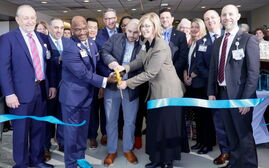Processing Your Payment
Please do not leave this page until complete. This can take a few moments.
- News
-
Editions
View Digital Editions
Biweekly Issues
- May 13, 2024
- April 29, 2024
- April 15, 2024
- April 1, 2024
- March 18, 2024
- March 4, 2024
- February 19, 2024
- February 5, 2024
- January 22, 2024
- + More
Special Editions
- Lists
- Viewpoints
- HBJ Events
- Business Calendar
- Custom Content
AG, lawmakers review implications of hospital antitrust suit
 Arielle Levin Becker | CT Mirror
A primary care office in Cheshire, part of Hartford HealthCare Medical Group.
Arielle Levin Becker | CT Mirror
A primary care office in Cheshire, part of Hartford HealthCare Medical Group.
A competitor’s antitrust lawsuit against Hartford HealthCare comes as Connecticut already was struggling to explore one of its central issues: What does the purchase of physician practices by hospitals do to competition, costs and care?
The lawsuit filed by Saint Francis Hospital and Medical Center accuses Hartford HealthCare of buying physician practices with the predatory intent of controlling the referrals that feed patients to its hospitals, surgical centers and other affiliates.
The General Assembly last year directed the state Office of Health Strategies to report by Feb. 1, 2023 whether it has sufficient regulatory powers to oversee the mergers and acquisitions of medical practices.
In an instant, the politically charged lawsuit brought to the fore what had been the concern of a low-profile working group, whose membership included a variety of stakeholders — including a physician from Hartford HealthCare and an executive from a Saint Francis affiliate.
Given the sweeping antitrust allegations, the 75-page lawsuit filed in U.S. District Court quickly became required reading in the office of Attorney General William Tong. A spokeswoman acknowledged it was under review.
The political sensitivity of the claims was evident in the courtesy calls Saint Francis made to Gov. Ned Lamont, House Speaker Matt Ritter of Hartford and others before declaring war on Hartford Hospital, its cross-town competitor and biggest piece of Hartford HealthCare.
“I’ve always enjoyed working with both of them, and I’ll remain committed to helping them both,” Ritter said. “They employ a lot of people, a lot of Hartford residents. Their workforces reflect the diversity of the city. And you know it’s hard when two friends are not in agreement on something.”
Hartford HealthCare says the suit is without merit. Saint Francis says Hartford’s predatory practices have taken away its major referrers of cardiac cases and produced a stunning migration of physicians — a 25% increase in the Hartford HealthCare’s staff in just two years.
The governor’s office declined comment, but legislators said the litigation underscores the volatile market dynamics of health care and renews questions about Connecticut’s ability to protect competition and preserve the medical practices of sole practitioners and unaffiliated group practices.
Victoria L. Veltri, the executive director of the Office of Health Strategy, said she could not comment on the merits of the claims, but the broader issue of the limits on the oversight of mergers and acquisitions of physician groups was central to the mission of the working group.
The office is responsible for administering the state’s primary tool for overseeing the business of medicine, the Certificate of Need program. It is described by OHS as “a regulatory process that prevents costly duplication of services, protects access to and continuity of health care services, and ensures Connecticut’s residents have a voice regarding health care for their communities.”
Sen. Heather Somers, R-Groton, the ranking Senate Republican on the legislature’s Public Health Committee, said the litigation will bring an urgency to the state’s struggle to assess the consolidation of health services and the state’s role in regulating it.
“I do think that this lawsuit will be interesting,” said Somers, who has a background in bioscience and is married to a physician. “I think it will bring to the surface some of these issues that really have to be discussed, because I think the focus should really be patient care and not making it easier for Yale or Hartford to get more patients.”
Yale New Haven and Hartford HealthCare are the two major hospital systems in Connecticut, the 800-pound gorillas of health care in Connecticut, in the wry view of Rep. Jonathan Steinberg, D-Westport, who said, “At least we have two 800-pound gorillas in Connecticut, not just one.”
The purchase of physician groups as a feeder of business is not new, even if Saint Francis contends that Hartford HealthCare’s approach has reached a tipping point capable of destabilizing other hospitals, said Steinberg, the co-chair of the Public Health Committee who formerly worked on the business side of health care.
“There’s a bigger issue at play here, which is what is the appropriate role of government in terms of interfering with market forces,” Steinberg said. “We’re a small state, diverse in the sense that we’ve got behemoths and we also have tiny hospitals that struggle each year to even break even.”
Seven years ago, Senate President Pro Tem Martin M. Looney, D-New Haven, and Republican Len Fasano of North Haven, then the Senate minority leader, raised similar concerns about the Yale New Haven’s acquisition of hospitals and physician groups.
“This is part of this monopoly of medicine, which is awful. And Marty and I tried to stop it from happening here in New Haven,” said Fasano, whose father was a family care physician. “I think that, unfortunately, by the time we recognized it and worked on it, the die was cast.”
“We were both worried about the issue of physician practices being taken over by the large hospital systems and the loss of physician autonomy at the time,” Looney said.
Ritter, a former Public Health Committee co-chair, said he remembers the fight as important, albeit one waged by two New Haven area politicians against a New Haven institution.
“It really hadn’t become an ugly issue in Hartford, to be honest, until yesterday,” Ritter said.
Related Content

2022 Giving Guide
This special edition informs and connects businesses with nonprofit organizations that are aligned with what they care about. Each nonprofit profile provides a crisp snapshot of the organization’s mission, goals, area of service, giving and volunteer opportunities and board leadership.
Learn more
Subscribe
Hartford Business Journal provides the top coverage of news, trends, data, politics and personalities of the area’s business community. Get the news and information you need from the award-winning writers at HBJ. Don’t miss out - subscribe today.
Subscribe
2024 Book of Lists
Delivering Vital Marketplace Content and Context to Senior Decision Makers Throughout Greater Hartford and the State ... All Year Long!
Read Here-
2022 Giving Guide
This special edition informs and connects businesses with nonprofit organizations that are aligned with what they care about. Each nonprofit profile provides a crisp snapshot of the organization’s mission, goals, area of service, giving and volunteer opportunities and board leadership.
-
Subscribe
Hartford Business Journal provides the top coverage of news, trends, data, politics and personalities of the area’s business community. Get the news and information you need from the award-winning writers at HBJ. Don’t miss out - subscribe today.
-
2024 Book of Lists
Delivering Vital Marketplace Content and Context to Senior Decision Makers Throughout Greater Hartford and the State ... All Year Long!
ABOUT
ADVERTISE
NEW ENGLAND BUSINESS MEDIA SITES
No articles left
Get access now
In order to use this feature, we need some information from you. You can also login or register for a free account.
By clicking submit you are agreeing to our cookie usage and Privacy Policy
Already have an account? Login
Already have an account? Login
Want to create an account? Register
Get access now
In order to use this feature, we need some information from you. You can also login or register for a free account.
By clicking submit you are agreeing to our cookie usage and Privacy Policy
Already have an account? Login
Already have an account? Login
Want to create an account? Register










0 Comments